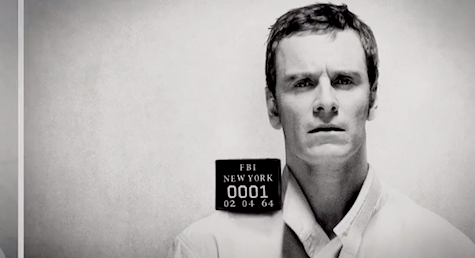We’ve got more shiny viral marketing for X-Men: Days of Future Past, and what it’s telling us is totally crazy. Well, okay, not totally crazy. But what it might mean for the upcoming film is sure to stir up a hearty stew of rumors.
(Potential spoilers and rumination on the plot of X-Men: Days of Future Past below.)
It begins with this video about the JFK assassination, which implicates a familiar face:
Wait, Magneto killed President Kennedy?
Well, not exactly. If you head over to the website linked from the video, you arrive at an information hub with pieces of the puzzle and a longer article on the whole story. It smartly uses plenty of real-life conspiracy theories surrounding the assassination to fuel an alternate history that will serve as reality in the new movie. The title of the site is “The Bent Bullet,” named for the projectile that hit both the Kennedy and Governor Connally somewhat… implausibly. The suggestion is that Magneto is responsible for the seemingly impossible shot by altering the bullet’s path. But the articles here give far better clues than the video—according to narrative given about Erik’s closed trial for the assassination:
Lehnsherr made his own closing argument. He insisted he was not guilty, and noted that no physical evidence linked him to the assassination.
“I did not shoot your president,” he told the jury. “But I know who did, and you’ll never find her. She has a way of hiding in plain sight.”
This is corroborated by quotes from both Lee Harvey Oswald and Oswald’s killer Jack Ruby (who both die very soon after the shooting in this timeline)—Oswald claims that there was a “double” of him walking around, and Ruby says that he “lost time” after being injected with a flu vaccine that he insists gave him cancer. They both die at the same hospital. This also plays into the comments made by Oswald’s wife about how he seemed like a “different person” in the days before the shooting.
And who pulled the trigger? Evidence points pretty heavily toward Mystique, of course. Magneto claims to the jury at his trial that he meant to stop her, but he still never gives her away. But why would she have reason to wish ill on the President?
This contributed to what Christopher S. Byrne, a retired Dallas Herald crime reporter, calls a “perfect storm of anti-Kennedy and unwitting anti-mutant sentiment” that saturated Dallas throughout that summer.
Indeed, mutant historians now call 1963 America’s “Summer of Hate.” Several mutants across the country were killed that year, including two members of Lehnsherr’s Brotherhood of Mutants. Azazel and Tempest were slain by Project: WideAwake operative in July. Records state the mutant duo ambushed the operatives.
Unless the film plans to play the comics card where Azazel is father to Mystique’s kid—Nightcrawler—it’s still looking a little confusing as to what her motivation might be on this one… unless she’s being manipulated by somebody? Somebody like Bolivar Trask, perhaps? Either way, we seem to have good reason for the strife between Erik and Raven that was hinted at in the first trailer for the film.
Magneto is found guilty during his trial and by this progression of events, Magneto has been in prison for years by the time that Days of Future Past begins. How the world is for mutants at this point, with him out of the picture and Charles Xavier circling a drain of depression and hopelessness remains to be seen. Could the assassination and Erik’s arrest have contributed to Charles’ downward spiral? (I’m going to go out on a limb here and say probably.)
Another odd point—the article seems to be written from a present-day perspective, one in which Erik Lehnsherr has been incarcerated for the assassination for the past 50 years. Based on what happened in the first Singer-directed X-Men films, we know that wasn’t how it went down, so how are we meant to take the article? Is this the future that will come to pass if Wolverine fixes everything? Or is this the timeline we had before Logan got the band back together? We know Magneto doesn’t stay in prison for the duration of the film, and he must break out at some point in the 1990s just so the events of the first X-Men film (and the opening scenes of X-Men: The Last Stand) can happen, so logic would seem to point to the latter. For words on how Days of Future Past plans to tackle time travel, we have words from Bryan Singer:
“The principle I looked at is this theory that until an object is observed, it hasn’t really happened yet. The time-traveller whose consciousness travels through time I call The Observer, and until The Observer returns to where he travelled from, the result hasn’t occurred yet. So he can muck about in the past and it isn’t until he snaps back that the new future is set. As a result, we’re able to have parallel action, and there’s an underlying tension because there’s always that threat Wolverine’s consciousness could return and leave the world in an even darker place.”
Read more at http://www.comicbookmovie.com/fansites/JoshWildingNewsAndReviews/news/?a=89215#KB1VcIvVAlBT4EbH.99
So that could all play together nicely—Wolverine gets Erik out of prison, makes Charles hope, and all the fixes happen once he gets back to the future. He opens his eyes and finds the X-Men having a barbeque on the lawn, and everybody is all happy and cuddly together. The End.
What does this mean for the film? Um, good things? Who knows! It’s just exciting to get more pieces of information while hungrily awaiting theater-time. Please, hand the movie over.
Emmet Asher-Perrin just wants Logan to fix things so Erik and Charles can be a superteam and play chess together every evening. Is that too much to ask? You can bug her on Twitter and read more of her work here and elsewhere.










